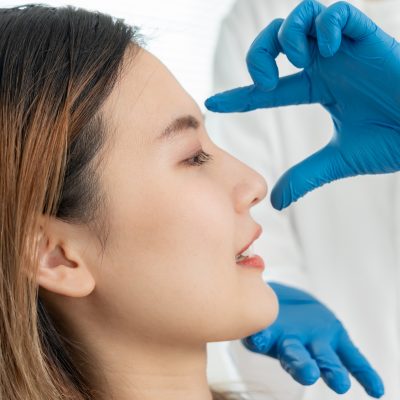Septoplasty and Reduction of Inferior Turbinates
If you suffer from breathing difficulties, frequent nasal congestion, or a deviated septum (partition wall of the nose), you may benefit from a septoplasty or coblation of inferior turbinates.You can request your preferred location when you contact us
Septoplasty and reduction of inferior turbinates are commonly performed together to improve nasal breathing and airflow. These treatments can benefit people who suffer from a deviated septum, enlarged inferior turbinates, or both. By straightening the nasal septum and reducing the size of the inferior turbinates, airflow in the nasal passages is improved, making it easier for you to breathe through the nose.
What is a septoplasty?
 A deviated septum is a common condition where the nasal septum (the thin wall that separates the nostrils) is crooked or misaligned. Your consultant may recommend a septoplasty to help correct the deviation and improve air flow.
A deviated septum is a common condition where the nasal septum (the thin wall that separates the nostrils) is crooked or misaligned. Your consultant may recommend a septoplasty to help correct the deviation and improve air flow.
Septoplasty surgery is a procedure that straightens the nasal septum. During septoplasty, your Consultant will make a small incision inside the nose and straighten the nasal septum by removing or reshaping the cartilage and bone causing an obstruction.
What is coblation of inferior turbinates?
The inferior turbinates are small, curved structures inside the nose that help to warm and moisten the air we breathe. However, in some people, the inferior turbinates can become enlarged or swollen, leading to difficulty breathing and chronic nasal congestion.
Coblation of inferior turbinates is a surgical procedure carried out through a small incision made inside the nose. Radiofrequency energy is used by your consultant to shrink and reduce the size of the inferior turbinates.
Locations
You can see expert consultants and have a range of scans and tests at either one of the below facilities. If you need a procedure, this will be carried out at KIMS Hospital in Maidstone.
KIMS Hospital
Find out more about the facilities available at KIMS Hospital.
Sevenoaks Medical Centre
Find out more about Sevenoaks Medical Centre, our consulting and diagnostic facility for patients in West Kent.
Prices & payment
We offer a guide price of:
The above are guide prices only.
Consultants
FAQs
What is septoplasty?
Septoplasty is a surgical procedure that corrects a deviated septum, which is a common condition where the nasal septum (the thin wall that separates the nostrils) is crooked or misaligned.
What is coblation of inferior turbinates?
Coblation of inferior turbinates is a surgical procedure carried out through a small incision made inside the nose. Radiofrequency energy is used by your Consultant to shrink and reduce the size of the inferior turbinates.
How long will I be in hospital after a septoplasty and coblation of inferior turbinates?
The operation takes between 30 mins to an hour, most people are able to go home the same day.
Will I need time off work after a septoplasty and coblation of inferior turbinates?
You should take at least 2 days off work, although most people take 1 week off work to recover. This can vary from person to person, depending on the work you do.
What is the cost of private Septoplasty at KIMS Hospital?
A private Septoplasty at KIMS Hospital starts from £3,274. You can use private medical insurance or pay for yourself. Flexible payment plans are available to spread the cost.
- Make a general enquiry
- Appointment enquiry
Our team are on hand to help answer any queries you might have about coming to visit us. You can use the form below and one of our team will be in touch. Alternatively to speak to a member of our friendly team, please call 01622 237 500.
Enquiry hours are Mon-Thurs 8am-8pm, Fri 8am-6pm and Saturday 8am-4pm.
If you would like to book an appointment, you can use the form below and one of our team will be in touch.
Alternatively to speak to a member of our friendly team, please call 01622 237 500.
Enquiry hours are Mon-Thurs 8am-8pm, Fri 8am-6pm and Saturday 8am-4pm.
Please be aware, if you are requesting a diagnostic scan such as an MRI, or CT, you must have a referral from a relevant clinician or Allied Health professional such as a physiotherapist.